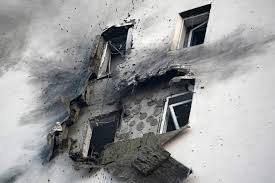Overview of the Situation
In a significant escalation of hostilities, air traffic around Moscow was thrown into chaos as the city’s Domodedovo Airport temporarily suspended all arrivals and departures due to a heavy drone assault on Thursday. This incident highlights the escalating tensions and the evolving tactics in the ongoing conflict between Russia and Ukraine.
Details of the Drone Attack
Russia's aviation authority, Rosaviatsia, confirmed that 105 Ukrainian drones were intercepted and destroyed by air defense systems, with 35 of those drones reportedly targeting Moscow directly. The Russian Ministry of Defense described the attack as one of the largest the capital has experienced, with Mayor Sergei Sobyanin assuring the public that emergency services were engaged in clearing debris from impacted areas.
Notably, this incident came just a day after a previous attempt involving 27 drones aimed at the city, signaling a persistent threat that the capital now faces. Despite the ongoing military operations, Moscow had relatively avoided similar assaults since the beginning of the conflict nearly three years ago, making this a notable turn of events.
Impact on Air Travel
On the day of the drone attacks, flight operations were halted at several key airports in Moscow, including Sheremetyevo, Vnukovo, Domodedovo, and Zhukovsky. This disruption of air travel service highlights the broader impact of military operations on civilian life in the capital.
Context of the Ukraine Conflict
These drone assaults come amidst a backdrop of persistent military confrontation between the two nations, particularly following Russia’s annexation of Crimea in 2014 and its military intervention in Ukraine. President Vladimir Putin has consistently rejected calls for a unilateral ceasefire from Kyiv and Western nations, demonstrating Moscow's commitment to its military objectives.
Ongoing military operations have had severe consequences, claiming tens of thousands of lives and displacing millions of people, as continued fighting has devastated regions across eastern and southern Ukraine.
Shifting Dynamics
Recent reports state that Russia has countered numerous drone attacks, as the Kremlin announced intercepting a staggering 485 drones over a three-day span across several regions, including Crimea. The utilization of drone warfare has evolved into a crucial element of military strategy for both sides in this prolonged conflict.
As the fighting continues, both countries seem entrenched in their positions with little indication of forthcoming negotiations to mitigate the escalating violence. President Putin’s administration has faced increasing pressure from international audiences regarding its persistent military engagements, raising speculation about the future trajectory of the war.
Conclusion
The situation in Moscow and the recent uptick in drone attacks signify an alarmingly shifting pattern in the conflict, where both Russia and Ukraine are likely to further intensify their military strategies. With significant humanitarian implications and civilian safety concerns, this ongoing confrontation continues to remain a focal point of international attention.
Bias Analysis
Key Questions About This Article




